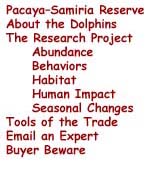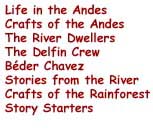|

|
Birgit Winning
|
How does the Oceanic Society choose research projects to support?
Potential research projects have to pass through several categories
of evaluation before we decide to support them.
First we evaluate if the project meets the conservation goals of
the Oceanic Society. The project must have scientific value. We want
to know if the research results can be applied to management and environmental
protection issues. The project must have a strong educational component
and there must be meaningful tasks for the volunteers who join us.
We must be assured that the project can be operated safely for our
volunteers and participants. And, lastly but just as important, we
want the projects we sponsor to help support local communities economically.
Why did the Oceanic Society choose to support this research project?
River dolphins are vulnerable and endangered worldwide. Yet
dolphins are still plentiful in the Pacaya-Samiria Reserve, and the
site offered us the opportunity to compare pristine (untouched) areas
with areas where human activities occur to measure the impact on the
dolphins. This is important information if we want to make certain that
dolphin populations remain healthy throughout the Amazon.
What other projects is the Oceanic Society currently operating?
We operate many projects all over the world. These are the
ones we are currently operating:
- The behavioral ecology of Midway Spinner Dolphins
- Habitat use of Belize Bottlenose Dolphins and Manatees
- Belize Coral Reef Health
- Suriname Sea Turtle Monitoring and Restoration
- The behavioral ecology of Bahamas Spotted Dolphins
- Habitat use of Whales and Dolphins of Monterey Bay
- Midway Atoll Seabird Monitoring
- Costa Rica Humpback Whale Research
- Rain Forest Wildlife Habitat Research
How many people work for the Oceanic Society?
Ten people work in our office headquarters here in San Francisco,
and over sixty people work in the field.
How does someone get to go on one of these expeditions?
Anyone who is in general good health, accepts the research
responsibilities outlined in our brochures, and is willing to study
and take directions can join us on one of our expeditions?
What is your background?
My graduate work was in integrative biology. I have worked
exclusively for nonprofit educational organizations.
What skills do you need for your job?
In general I need a lot of patience, self-motivation, and
organizational skills. More specifically in order to evaluate whether
or not we should sponsor a project, I need a background in biology.
Because these projects take place all over the world, I must also have
some background in political science and policy. Lastly, because the
Oceanic Society is a nonprofit organization, I need to have a good handle
on matters of business and finance.
Who have been your mentors and role models?
The dedication and sacrifices of the many individual field
biologists and grass roots conservationists that I have met have motivated
me to continue to support their conversation efforts. This is a special
group of people who continually work in often uncomfortable environments
so that the variety and diversity of animal and plant life can be protected
in the world.
Back to top
|





